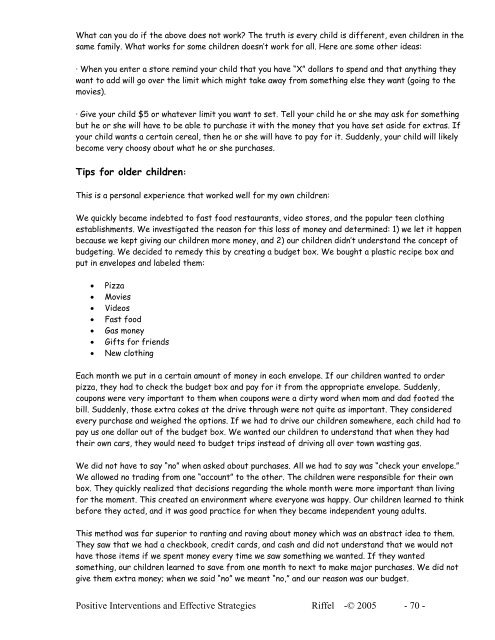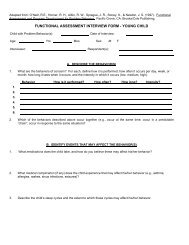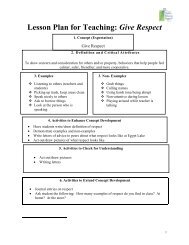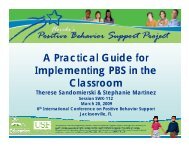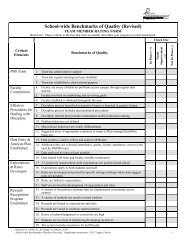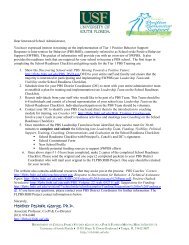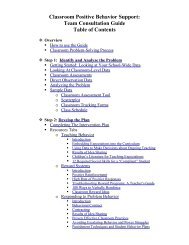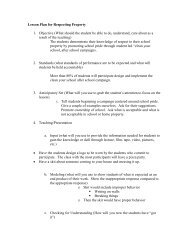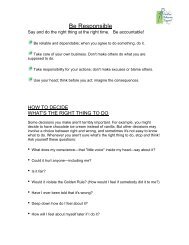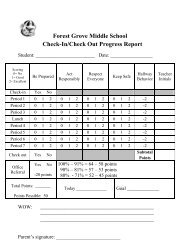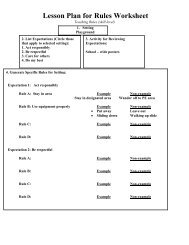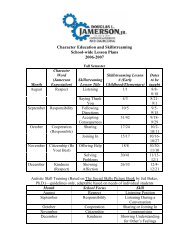Georgia PBS Interventions - Florida's Positive Behavior Support ...
Georgia PBS Interventions - Florida's Positive Behavior Support ...
Georgia PBS Interventions - Florida's Positive Behavior Support ...
- No tags were found...
Create successful ePaper yourself
Turn your PDF publications into a flip-book with our unique Google optimized e-Paper software.
What can you do if the above does not work? The truth is every child is different, even children in thesame family. What works for some children doesn’t work for all. Here are some other ideas:· When you enter a store remind your child that you have “X” dollars to spend and that anything theywant to add will go over the limit which might take away from something else they want (going to themovies).· Give your child $5 or whatever limit you want to set. Tell your child he or she may ask for somethingbut he or she will have to be able to purchase it with the money that you have set aside for extras. Ifyour child wants a certain cereal, then he or she will have to pay for it. Suddenly, your child will likelybecome very choosy about what he or she purchases.Tips for older children:This is a personal experience that worked well for my own children:We quickly became indebted to fast food restaurants, video stores, and the popular teen clothingestablishments. We investigated the reason for this loss of money and determined: 1) we let it happenbecause we kept giving our children more money, and 2) our children didn’t understand the concept ofbudgeting. We decided to remedy this by creating a budget box. We bought a plastic recipe box andput in envelopes and labeled them:• Pizza• Movies• Videos• Fast food• Gas money• Gifts for friends• New clothingEach month we put in a certain amount of money in each envelope. If our children wanted to orderpizza, they had to check the budget box and pay for it from the appropriate envelope. Suddenly,coupons were very important to them when coupons were a dirty word when mom and dad footed thebill. Suddenly, those extra cokes at the drive through were not quite as important. They consideredevery purchase and weighed the options. If we had to drive our children somewhere, each child had topay us one dollar out of the budget box. We wanted our children to understand that when they hadtheir own cars, they would need to budget trips instead of driving all over town wasting gas.We did not have to say “no” when asked about purchases. All we had to say was “check your envelope.”We allowed no trading from one “account” to the other. The children were responsible for their ownbox. They quickly realized that decisions regarding the whole month were more important than livingfor the moment. This created an environment where everyone was happy. Our children learned to thinkbefore they acted, and it was good practice for when they became independent young adults.This method was far superior to ranting and raving about money which was an abstract idea to them.They saw that we had a checkbook, credit cards, and cash and did not understand that we would nothave those items if we spent money every time we saw something we wanted. If they wantedsomething, our children learned to save from one month to next to make major purchases. We did notgive them extra money; when we said “no” we meant “no,” and our reason was our budget.<strong>Positive</strong> <strong>Interventions</strong> and Effective Strategies Riffel -© 2005 - 70 -


